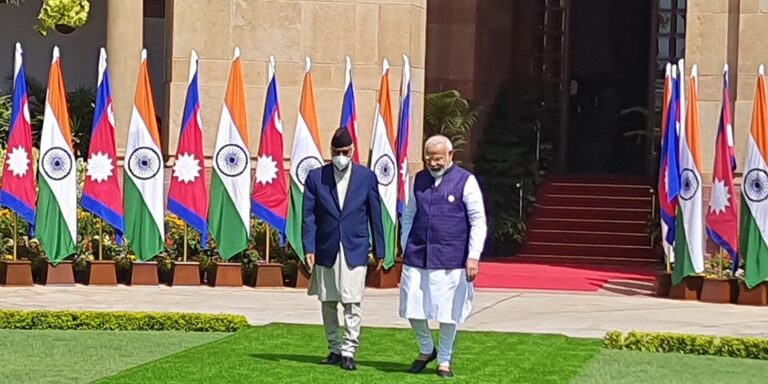
Prime Minister Sher Bahadur Deuba and his Indian counterpart Narendra Modi have taken positively the forming of a joint mechanism to resolve the border issues between the two countries.
In a special meeting held between the two premiers at the Hyderabad House in New Delhi on Saturday afternoon, PM Deuba had proposed for such a mechanism to PM Modi and the latter had responded to it positively.
“We discussed the boundary issues and I urged PM Modi to resolve them through established mechanisms,” PM Deuba said at the joint press conference organised following the talks.
The two PMs talked about border issues, security concerns, partnership and cooperation in energy development, and enhancement of connectivity network for the economic development.
PM Deuba is in New Delhi for a three-day official visit of India at the invitation of PM Modi.
In the meeting that lasted for about 45 minutes, the two Prime Ministers agreed to advance the bilateral relations between Nepal and India and enhance bilateral cooperation. Likewise, an agreement was also made to strengthen the bilateral relations by finding solutions to the unresolved issues on the basis of mutual trust and interest. “We look up to the tremendous economic transformation that India has achieved. We are eager to benefit from India’s progress through a mutually beneficial economic partnership,” PM Deuba said.
Following the talks, a delegation-level talk was held between the delegates of the two countries. PM Deuba and PM Modi addressed a press conference following their talks.
The two PMs jointly flagged off the inaugural passenger service between Jayanagar-Kurtha rail link, which was constructed under Indian assistance. They also witnessed the exchange of Memorandum of Understanding on Technical Cooperation in Railway Sector, inaugurated 90km long 132 KVDC Solu Corridor Transmission Line Project built under Indian line of credit, and launched the operation of RuPay cards in Nepal that is expected to promote the flow of Indian tourists to Nepal.
Likewise, they agreed to conclude the revised Transit Treaty which will facilitate the operationalisation of rail, cargo, transhipment, private operators, inland waterways and access to additional ports. They also discussed early completion of DPR of Pancheshwar Multipurpose Project, which could be a milestone of Nepal-India cooperation in hydropower development.
PM Deuba said that they also discussed building an integrated check-post (ICP) and dry port in Chandani and Dodhara and agreed on early completion of the ongoing construction work of ICP Nepalgunj. “I requested India for early commencement of construction of the ICP in Bhairahawa,” he said.
Similarly, there were discussions on cooperation in civil aviation and Nepal requested for additional air entry routes to Nepal through Mahendranagar, Nepalgunj and Janakpur, and also for the concurrence of near border flight operations to smoothly operationalise the Gautam Buddha International Airport in Bhairahawa.
PM Deuba also said that the cross-border power trade remained a priority agenda during the discussion. “I am happy on the Nepal-India Joint Vision Statement on Power Sector Cooperation that we have agreed upon today for mutually beneficial cooperation on hydroelectricity generation, transmission and cross-border trade. I welcome PM Modiji’s offer of purchasing electricity from Nepal,” said PM Deuba.
According to the Ministry of External Affairs of India, both Prime Ministers discussed the unprecedented opportunities for mutually beneficial cooperation in energy sector.
“A Joint Vision Statement on Power Sector cooperation that spells out the shared commitment as well as opportunities for win-win collaboration in power generation, transmission, and trade was concluded during the visit,” the MEA said in a statement.
It said that both PMs also exchanged views on the economic and trade agenda and decided to accelerate action to further deepen and facilitate trade, investment and connectivity linkages.
They welcomed the recent conclusion of the G-to-G agreement to facilitate the long-term supply of fertilisers from India to Nepal and renewal of five-year General Supply Agreement for petroleum products from India to Nepal.
Warm welcome
Even though it is the fifth official visit of PM Deuba to India, the latter had accorded high importance to it. Welcome banners were installed along the way from airport to Mourya Hotel, residence of PM Deuba, and the entire road was made vacant for the high-level guest’s arrival.
The PMs of Nepal and India have met after four years. The then PM KP Sharma Oli had made an official entourage of India in March 2018.
The bilateral relations between the two countries touched the lowest ebb after November 2019 following India’s publication of its country map including Nepal’s Limpiyadhura and Lipulek in its territory.
In response, in May 2020, Nepal published political and administrative map of the country including the territory encroached by India as its land. The map was ratified by both the houses of the Parliament as well.
PM Deuba’s visit has opened the way for dialogue and cooperation between the two countries. His delegation includes Minister for Foreign Affairs, Dr. Narayan Khadka, Minister for Energy, Water Resources and Irrigation, Pampha Bhusal, Minister for Health and Population, Birodh Khatiwada, Minister for Agriculture and Livestock Development, Nepal’s Ambassador to India, Dr. Shankar Sharma, Foreign Secretary Bharat Raj Paudyal and other high government officials.
Source : TRN,






